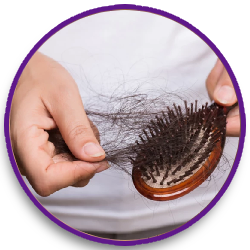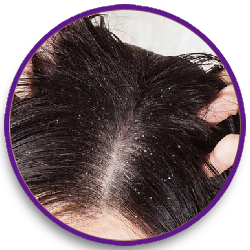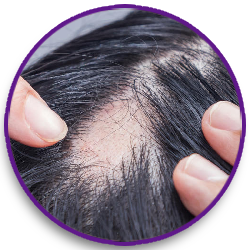Hair Issues
The Skin Clinic
HAIR ISSUES


DRY / DAMAGED HAIR
Overuse of hair care products, heat styling, colouring, straightening etc can damage the hair shaft and cause loss of moisture from the cuticular layers giving the appearance of dull, discoloured and damaged hair.
...
Dry hair is a condition of the hair that results from the loss of natural moisture. The main causes of dry hair are exposure to sun, wind, harsh chemicals and over-processing with heat styling tools. Dry hair can be very difficult to manage and often leads to breakage. Damaged hair is a condition of the hair that results from excessive heat styling, chemical processing or other forms of trauma. Damaged hair often looks dull, frizzy and lifeless. It can be very difficult to manage and often leads to breakage. Overuse of hair care products, heat styling, colouring, straightening etc can damage the hair shaft and cause loss of moisture from the cuticular layers giving the appearance of dull, discoloured and damaged hair.
There are a number of ways to treat dry and damaged hair. Deep conditioning treatments are one of the best ways to replenish moisture and repair damage. There are many different types of deep conditioners on the market, so it is important to choose one that is right for your hair type. Other options include using a leave-in conditioner or oil treatment.
At The Skin Clinic, we understand the importance of having healthy and good-looking hair. That's why we offer a wide range of hair care services and treatments that can help repair and restore your hair to its natural glory.
Our Hair Fall Specialist Doctor in Thane west Dr. Vandita Hede will first assess your hair type and scalp condition before recommending the best course of treatment for you. We also use only the latest and most advanced technologies and products to ensure that you get the best results possible. So if you're looking for a reliable and trustworthy place for all your hair care needs, look no further than The Skin Clinic.
Contact us today to book an appointment.

MALE PATTERN BALDNESS
Male Pattern Baldness (MPB) is the most common form of hair loss in men, affecting around half of all guys by the age of 50. It usually starts with a bit of thinning at the temples which can progress to a receding hairline and/or bald spots on the head. In time, the hairline recedes towards the back of the head and forms an ‘M’ shape. Eventually, you are left with a horseshoe-shaped ring of hair around the back and sides of your head. MPB affects different people in different ways. Some experience just a few thinning hairs while others lose more extensively.
...
Development Of Male Pattern Baldness
MPB is caused by a combination of genetics and hormones. It usually starts in adulthood and gets worse with age. The condition is also thought to be related to the hormone dihydrotestosterone (DHT), which is made from testosterone. DHT causes the hair follicles to miniaturise, leading to thinner hair and eventually baldness.
The main symptom of MPB is hair loss from the scalp. This can occur gradually or suddenly. You may first notice that your hair is thinning at the temples or the crown of your head. As MPB progresses, you may develop a receding hairline or bald patches. In time, you may be left with only a rim of hair around the sides of your head.
Main cause of the condition is a genetic tendency. It is due to the weakening, shrinking and ultimately loss of the hair follicle under the influence of male sex hormones called androgens. There is hair loss typically on the top and front of the crown area of the scalp. It can be effectively controlled when appropriate treatment is initiated early.
Treatment
This is a very common condition, characterised by progressive hair loss from the top and front of the scalp in a defined pattern. In men, this pattern is classically an ‘M’ shape. It can be effectively controlled when appropriate treatment is initiated early with the Hair Fall Specialist Doctor in Thane west.
Dr. Vandita Hede uses different modalities like medical therapy (oral and topical), low level laser therapy, platelet-rich plasma therapy & mesotherapy for the same. The choice of treatment depends on the stage of hair loss, age of the patient, associated medical conditions & response to previous treatments. Some patients may require a combination of these modalities to get optimal results. Maintenance therapy may be required to keep the hair loss under control and to sustain the results achieved. If you or someone you know is experiencing hair loss, it’s important to see a dermatologist to find out what’s causing the problem and how it can be treated.

FEMALE PATTERN HAIR LOSS
Female pattern hair loss is comparable to male pattern baldness. It is a result of multiple factors such as hormonal, environmental and genetics. It is often associated with polycystic ovarian disease. It is characterized by hair thinning and loss over the top and sides of the scalp while the frontal hair line is usually intact. Medical and procedural treatments can help in effectively controlling the condition.
...
Cause of Female Pattern Hair Loss
There are various factors that contribute to female pattern hair loss, including hormonal, environmental and genetic factors. One of the main contributing factors is polycystic ovarian disease (PCOD), which is a condition that affects women of reproductive age. PCOD is characterized by the presence of multiple cysts in the ovaries, and it is often associated with hormonal imbalance. This can lead to hair thinning and loss over the top and sides of the scalp, while the frontal hairline is usually intact. Other contributing factors include stress, nutritional deficiencies and certain medications.
Female Pattern Hair Loss Treatment
There are various medical and procedural treatments that can help in effectively controlling female pattern hair loss. One of the main treatments is oral contraceptives, which can help regulate hormones and reduce the effects of PCOD. Minoxidil (Rogaine) is another effective treatment that can be used topically to stimulate hair growth. In some cases, surgery may also be recommended to correct the underlying cause of the condition.
If you are experiencing hair loss, it is important to consult a dermatologist to determine the underlying cause and develop an effective treatment plan. Dr Vandita Hede is a board-certified dermatologist with more than 16 years of experience in the field. She is a well known Hair Fall Specialist Doctor in Thane west. She will work with you to determine the best course of treatment for your individual needs.
At The Skin Clinic, we are committed to excellence in skin and hair disorders, laser treatments and aesthetics. We offer a wide range of services to meet your needs and provide the best possible care.
Contact us today to schedule an appointment with Dr Hede.

PRE-MATURE HAIR GREYING
Greying of hair before the age of 30 is deemed premature. Genetic causes, nutritional deficiencies, thyroid disorders, anaemia, oxidative stress, drugs, etc. may be responsible. While genetic greying cannot be reversed, in other cases, correction of the causative factor can reverse the condition.
...
Cause Of Premature Hair Greying
The colour of hair is determined by the presence of a pigment called melanin. Melanocytes are cells in the hair bulb that produce melanin. As we age, the activity of these cells decreases, and hair starts to lose its colour and turns grey. While this is a natural process, sometimes people may start to see grey hair much earlier than expected. This is known as premature greying of hair. There are several factors that can contribute to premature greying of hair, including:
• Genetics: This is the most common cause of premature greying of hair. If your parents or grandparents had grey hair at a young age, you are more likely to have it too.
• Nutritional deficiencies: A lack of certain nutrients, such as iron, can lead to premature greying of hair. This is because these nutrients are necessary for the production of melanin.
• Thyroid disorders: An underactive or overactive thyroid gland can cause a wide range of problems, including premature greying of hair.
• Anaemia: This is a condition in which there is a decrease in the number of red blood cells. Anaemia can be caused by a lack of iron, and it can lead to premature greying of hair.
• Oxidative stress: This is a condition in which there is an imbalance between the production of free radicals and the body’s ability to counteract their effects. Free radicals are reactive molecules that can damage cells, and oxidative stress is thought to contribute to the ageing process.
Treatment for Premature Hair Greying
The treatment of premature greying will depend on the underlying cause. If the cause is genetic, there is no cure. However, if the cause is nutritional deficiencies, thyroid disorders, anaemia, or oxidative stress, treatment can help to reverse the condition. The most important thing you can do is to identify the underlying cause and correct it. This will help to prevent further greying of hair and may even reverse the process.
If you are experiencing premature greying of hair, it is important to see the Hair Fall Specialist Doctor in Thane west for a proper diagnosis. They will be able to determine the underlying cause and recommend the best course of treatment.
Dr. Vandita Hede is one of the most experienced and renowned dermatologists in Mumbai, with more than 16 years’ experience in the field. She is committed to excellence in skin and hair disorders, laser treatments and aesthetics. If you are concerned about premature greying of hair, visit The Skin Clinic for a consultation with Dr Vandita Hede.

CYCLICAL HAIR LOSS
Losing 50 to 100 strands of hair a day is not a cause of concern but if this regular hair cycle is disrupted, one can lose hair faster than it is regenerated causing transient thinning of hair. Stress, illness, surgery, dietary deficiencies, drugs, weight loss, hormonal disorders etc may be responsible for this treatable condition.
...
Cause Of Cyclical Hair Loss
There are many reasons that can lead to cyclical hair loss. Most often, it is due to hormonal changes in the body. When the levels of androgens (male hormones) in the body increase, it can lead to hair loss. This can be a result of puberty, menopause, or other conditions that affect hormone levels. Other possible causes of cyclical hair loss include:
• Stress: Physical or emotional stress can trigger a type of hair loss called telogen effluvium. In this condition, the hair goes into the resting phase (telogen) and falls out more quickly than usual. This can happen after a major life event, such as a death in the family, surgery, or a stressful job change.
• Illness: A serious illness can lead to a type of hair loss called anagen effluvium. This is when the hair follicles are damaged and the hair falls out before it reaches the resting phase. conditions that can cause anagen effluvium include cancer, chemotherapy, and radiation therapy.
• Surgery: Hair loss can occur after any type of surgery. This is usually due to the stress of the surgery and the anaesthesia. It usually grows back within a few months.
• Dietary deficiencies: A lack of certain nutrients, such as protein, iron, or zinc, can cause hair loss.
• Drugs: Some medications can cause hair loss, such as those used to treat cancer, arthritis, depression, heart problems, and high blood pressure.
Treatment for Cyclical Hair Loss
At Skin Clinic, we offer a range of treatments for cyclical hair loss, depending on the underlying cause. If the hair loss is due to a hormonal imbalance, we may recommend hormone therapy. For telogen effluvium, we may suggest stress-reducing measures, such as yoga or meditation. If anagen effluvium is caused by chemotherapy, we can provide treatment to help the hair grow back.
Schedule an appointment with us today to find out which treatment is right for you.

DANDRUFF
Dandruff is one of the most common scalp conditions. It is characterised by itchiness and flaking of the skin on your scalp. Dandruff may be caused by a number of factors, including dry skin, oily skin, yeast overgrowth, or sensitivity to certain hair care products. While it is not contagious or harmful, dandruff can be embarrassing and difficult to get rid of. There are a number of ways to treat dandruff, including over-the-counter shampoos, home remedies, and prescription medications.
...
Causes Of Dandruff
Dandruff is caused by a variety of factors, including dry skin, oily skin, yeast overgrowth, or sensitivity to certain hair care products.
• Dry Skin: Dry skin is the most common cause of dandruff. When your skin is dry, it produces more dead skin cells than usual. These dead skin cells can then flake off, leading to dandruff.
• Oily Skin: Oily skin can also lead to dandruff. When your skin is too oily, it can create an ideal environment for yeast to grow. This overgrowth of yeast can cause irritation and flaking.
• Yeast Overgrowth: Yeast is a type of fungus that naturally lives on your skin. However, an overgrowth of yeast can lead to dandruff. This overgrowth may be caused by a number of factors, including an unhealthy diet, stress, or a weakened immune system.
• Sensitivity to Hair Care Products: Some people may be sensitive to certain ingredients in hair care products, such as shampoo, conditioner, or hair gel. This sensitivity can cause irritation and flaking.
Treatment for Dandruff
Dandruff is a condition of the scalp that causes flakes of skin to appear. It's a common problem that's not serious and can be treated with over-the-counter dandruff shampoo. However, some people may experience more severe dandruff, which can lead to itching, redness, and scaling of the scalp. This is known as seborrheic dermatitis and may require treatment from a doctor.
Dr. Vandita Hede is a board-certified dermatologist and well known as Hair Fall Specialist Doctor in Thane west who can provide effective treatment for dandruff and seborrheic dermatitis. She will work with you to determine the cause of your condition and create a customised treatment plan that may include medicated shampoos, topical creams or ointments, oral medications, or light therapy. With her expertise in treating these conditions, she can help you find relief from the symptoms and get your scalp back to normal.

ALOPECIA
Sudden development of patches of hair loss may be due to auto immune conditions like lichen planus, discoid lupus erythematosus, alopecia areata, bacterial or fungal infections of the scalp etc. A thorough examination and investigations are required to diagnose and treat effectively.
...
Causes Of Alopecia
There are many different factors that can contribute to the development of alopecia. In the case of androgenetic alopecia, it is thought to be caused by a combination of genetic and hormonal factors. Androgens are a group of hormones that play a role in hair growth. testosterone is one type of androgen. People with a family history of pattern baldness are more likely to develop this type of alopecia. Other factors that may contribute to the development of androgenetic alopecia include:
• Ageing
• Stress
• Anaemia
• Thyroid problems
• Autoimmune disorders
• Certain medications
Treatment For Alopecia
Alopecia can affect both men and women, and can range from mild hair thinning to complete baldness. While there are many potential causes of alopecia, the exact cause is unknown in most cases. There is no cure for alopecia, but there are treatments that can help to improve the appearance of the hair and prevent further hair loss. Dr. Vandita Hede is a specialist in the treatment of alopecia. She has extensive experience in the use of both medical and surgical treatments for alopecia, and can tailor a treatment plan to meet the individual needs of each patient. If you are concerned about hair loss, Dr. Vandita Hede as the leading Hair Fall Specialist Doctor in Thane west can provide you with the expert care and advice you need to restore your confidence.
If you would like to learn more about alopecia treatment at The Skin Clinic, or to book an appointment with Dr Vandita Hede, please contact us today.

